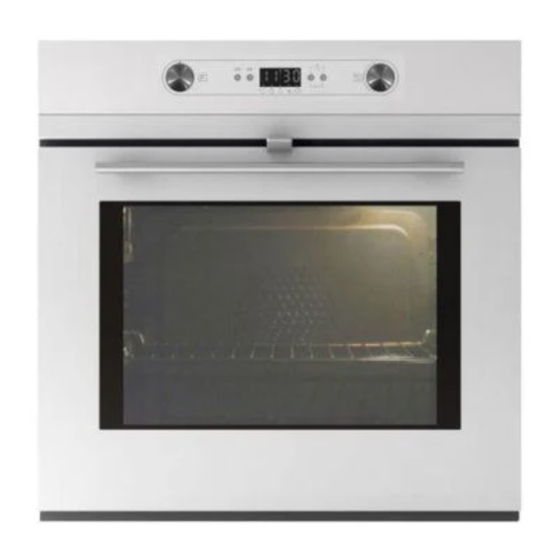IKEA NUTID Installation And User Instructions Manual - Page 14
Browse online or download pdf Installation And User Instructions Manual for Oven IKEA NUTID. IKEA NUTID 46 pages. French door refrigerator
Also for IKEA NUTID: Installation Manual (16 pages), Installation Manual (12 pages), Assembly Instructions Manual (12 pages)

To Access the User Preferences Menu:
1. Press and hold the Door Alarm touch pad for 3 seconds.
The preference name will appear in the Freezer display and
the preference status (F or C) or (ON or OFF) will appear in
the Refrigerator display.
2. Use the Freezer (+) or (-) touch pads to scroll through the
preference names. When the desired preference name is
displayed, press the Refrigerator (+) or (-) touch pads to
change the preference status.
3. Set your preferences by pressing and holding the Door
Alarm touch pad for 3 seconds, or by shutting the
refrigerator compartment door.
Crisper Humidity Control
You can control the amount of humidity in the moisture-sealed
crisper. Depending on your model, adjust the control to any
setting between FRUIT and VEGETABLES or LOW and HIGH.
FRUIT/LOW (open) for best storage of fruits and vegetables
with skins.
VEGETABLES/HIGH (closed) for best storage of fresh, leafy
vegetables.
Ice Maker
(on some models)
IMPORTANT: Flush the water system before turning on the ice
maker. See "Water Dispenser."
Turning the Ice Maker On/Off
To turn the ice maker ON, simply lower the wire shutoff arm.
To manually turn the ice maker OFF, lift the wire shutoff arm to
the OFF (arm up) position and listen for the click.
NOTE: Your ice maker has an automatic shutoff. As ice is
made, the ice cubes will fill the ice storage bin and the ice
cubes will raise the wire shutoff arm to the OFF (arm up)
position. Do not force the wire shutoff arm up or down.
NOTE: Turn off the ice maker before removing the ice storage
bin to serve ice or to clean the bin. This will keep the ice
cubes from dropping out of the ice maker and into the freezer
compartment. After replacing the ice storage bin, turn on the
ice maker.
Ice Production Rate
The ice maker should produce a complete batch of ice
■
approximately every 3 hours.
To increase ice production, lower the freezer and refrigerator
■
temperature. See "Using the Controls." Wait 24 hours
between adjustments.
14
Remember
Allow 24 hours to produce the first batch of ice. Allow 3
■
days to completely fill the ice storage bin. Discard the first
three batches of ice produced.
The quality of your ice will be only as good as the quality
■
of the water supplied to your ice maker. Avoid connecting
the ice maker to a softened water supply. Water softener
chemicals (such as salt) can damage parts of the ice
maker and lead to poor quality ice. If a softened water
supply cannot be avoided, make sure the water softener is
operating properly and is well maintained.
Do not store anything on top of the ice maker or in the ice
■
storage bin.
Water Dispenser
(on some models)
IMPORTANT:
After connecting the refrigerator to a water source or
■
replacing the water filter, flush the water system. Use a
sturdy container to depress and hold the water dispenser
lever for 5 seconds, then release it for 5 seconds. Repeat
until water begins to flow. Once water begins to flow,
continue depressing and releasing the dispenser lever (5
seconds on, 5 seconds off) until a total of 4 gal. (15 L) has
been dispensed. This will flush air from the filter and water
dispensing system, and prepare the water filter for use.
Additional flushing may be required in some households. As
air is cleared from the system, water may spurt out of the
dispenser.
NOTE: After 5 minutes of continuous dispensing, the
dispenser will stop dispensing water to avoid flooding. To
continue dispensing, press the dispenser button again.
Allow 24 hours for the refrigerator to cool down and chill
■
water. Dispense enough water every week to maintain a
fresh supply.
Dispensing Water
1. Hold a container under the dispenser while pressing the
button.
2. Release the button to stop dispensing.
